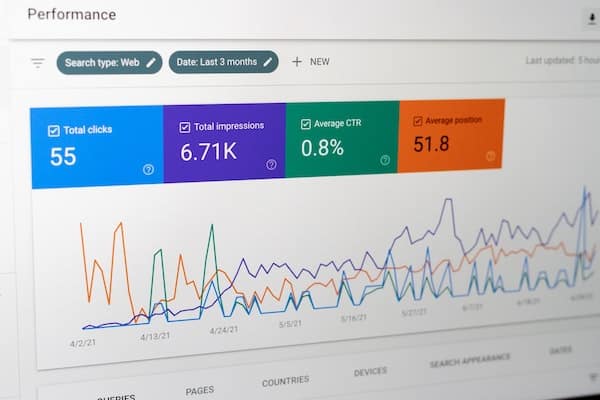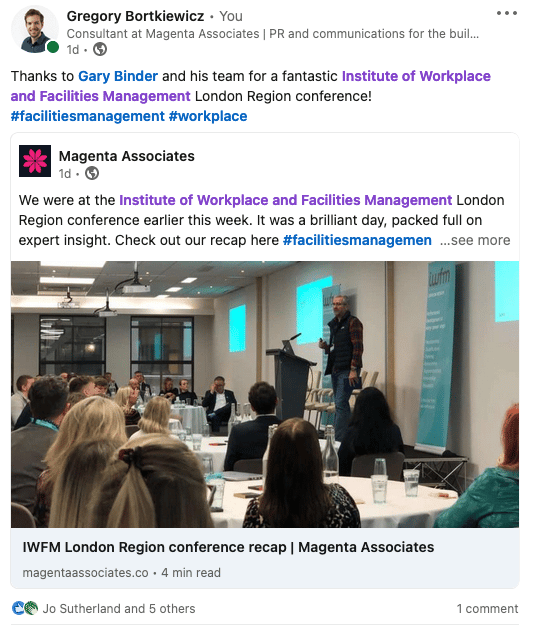The three core pillars of search engine optimisation (SEO) are on-site (technical), off-site (backlinks) and content. Within those three broad pillars there are numerous other facets to consider, such as ensuring content follows the principles of E-A-T – expertise, authoritativeness, and trustworthiness. So how does social media impact SEO factors, and can social media support SEO?
Does social media impact SEO?
Social media is not actually a direct ranking signal – there is no direct connection between social media activity and SEO. However, there are many indirect ways social media can support SEO.
This article will explain why social media should be a part of your SEO strategy.
Brand awareness
Social media is a vital tool in raising brand awareness. For B2B marketing, LinkedIn is the most popular tool. If you have an active presence on social media and share helpful content, you should gain more followers and engagements. As these increase, more people will see your company in their feeds and brand awareness will grow.
This may lead to more people searching for your company in Google. If they search for your brand plus a particular keyword and have a positive interaction with your site (such as time spent on the page or downloading a resource), Google will deem that your website is relevant to the subject, and you may even start to rank better for similar searches without your company in them.
Driving traffic
Social media is an important source of website traffic. Take a look in Google Analytics and see which channels are driving people to your website. If a particular blog is receiving a lot of engagement and shares, that send a signal to Google and that page may see a bump in ranking. Of course, there are numerous other factors at play when it comes to ranking, but any channels that send traffic to your website are worth investing in.

In the dream scenario, something you share on social media might go viral. In that case, you’ll receive a lot of backlinks as people link back to your content and see a bump in page ranking for relevant keywords.
Search engine results
Although social media itself isn’t a direct ranking factor, social media pages are often some of the top results in Google searches for branded keywords. For example, when I search ‘Magenta Associates’, our Twitter and LinkedIn pages are the top results after our website. This gives searchers, many of whom might be prospects, multiple options of how they can find out more about our business.
So, social media can support SEO. But you’ll need to follow best practice to reap the most rewards.
How to optimise social media channels for SEO
Complete your profiles
Incomplete or incorrect profiles are a wasted opportunity and send a message to users that you are not engaged or not interested. It’s critical that your name, address and phone number is correct and consistent across all channels. Use the about section to get across your key messages, and use keywords where relevant – but don’t cram them in for the sake of it. Include your URL and have a call to action.

Use hashtags and keywords in posts
As with an about section, write for your audience and don’t use lots of keywords for the sake of it. However, be sure to include them when relevant and make use of hashtags. When people search those terms on a social media network, your posts will have a better chance of appearing higher up in the results.
Post links to your site
This is pretty common practice but bears repeating. You want people to visit your site so make sure you give them a way! You can also experiment with this. We’ve recently found that social media networks prefer posts without a link in the main post, as they want to keep users on their site. As a result, we post on LinkedIn and add a link in a comment under the post.
Edit the title and description
When you add a URL to a LinkedIn post it may not pull through your desired title, description and image. These can all be edited easily when creating your post and it’s well worth doing so. A title of ‘Why social media should be a part of your SEO strategy’ is much more engaging than ‘Magenta blog’ and tells the audience exactly what to expect.
Share quality content
Don’t fall into the trap of using social media purely as a sales tool. Writing a caption about why your company is great and sharing a link to a contact page is not engaging content. Share content that is timely, helpful or interesting, and take a minute or two to write a compelling caption.
Summary
This should leave you in little doubt about why social media should be a part of your SEO strategy. One caveat – don’t create accounts on numerous channels if you don’t have the resource to stay active on all of them. Similarly, prioritise those that make the most sense. If you don’t have a steady stream of high-quality picture content, Instagram might not be the best option for your business.
We support various clients with SEO, often as part of a wider PR and communications programme. Check out our search engine optimisation service page for more information, or contact us to discuss how we can support your business.








